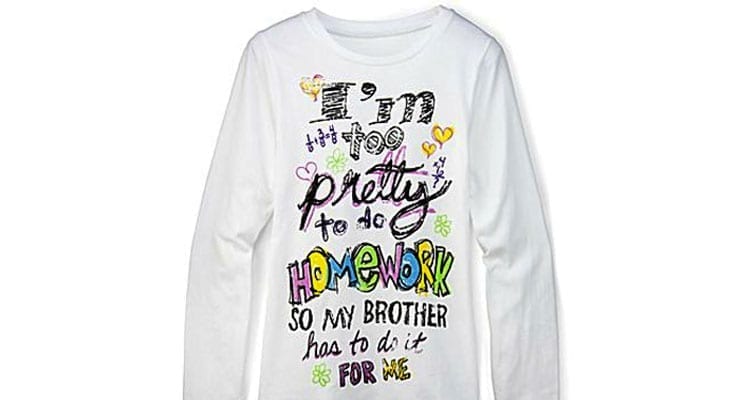It was on sale for $9.99 and came in girls’ sizes 7-16. The copy that promoted the long-sleeved T-shirt read thusly: “Who has time for homework when there’s a new Justin Bieber album out? She’ll love this tee that’s just as cute and sassy as she is.”
What did the T-shirt in question say? “I’m too pretty to do homework so my brother has to do it for me.” And it was being sold by the all-American, mainstream retailer JCPenney.
As soon as I saw mention of this abomination on Twitter, I researched it, blogged about it, read others’ outrage on Twitter and looked at the online petition that had been started to get JCPenney to “stop promoting sexist messaging to girls.”
“If JCPenney were a TV network, it would have told us the offensive T-shirt was actually a form of ‘empowerment,’” mused TV critic TVMcGee.
One sarcastic, funny blogger, BusyMom, Tweeted: “I’m too pretty to do Twitter, y’all have to do it for me.”
But the shirt wasn’t funny. Even though the company swiftly pulled the shirt off the web site and distributed a disingenuous press statement saying that they didn’t wish to “offend” their customers, all I could wonder was how such a T-shirt could’ve gotten this far, who green-lighted its sale, who wrote that copy?
Over the weekend, I watched a press screener for the devastatingly depressing new documentary Miss Representation about the horrific, long-lasting impact that this kind of “I’m too pretty to do homework” message has on young girls and women. “Girls get the message very early on that what’s most important is how they look . . . that their value, their worth depends on that,” Jean Kilbourne – author, scholar and the woman behind her own documentary about sexism in the media, Killing Us Softly – told the documentary filmmaker. When girls are sent the message that they are and should be seen as pretty little objects, “They learn to see themselves as objects,” Kilbourne said. And objects don’t run for president, run companies or, apparently, do homework.
Among the damning statistics in Miss Representation – which depicts the impact of sexism on women’s political and business power, as well as on girls’ beliefs about their own value – were these: 53 percent of 13-year-old girls reported in a survey to be unhappy with their bodies and by the time they reach 17, that number rose to 78 percent.
When girls get bombarded with messages like the one on JCPenney’s ill-fated T-shirt, it has a cumulatively negative effect. Caroline Heldman, associate professor of Political Science at Occidental College, said in Miss Representation that when children are 7 years old, boys and girls say they want to become president in roughly the same numbers. By the time they’re 15, however, the number of girls who say they would like to be president drops off dramatically as compared to the boys. You see, if you’re too busy focusing on Justin Bieber’s latest CD and are having your brother do your homework while you work on your spray tan, how could you possibly become president?
On and on the grim statistics went in this documentary, like a funeral procession carrying the caskets containing the would-be hopes and dreams of women: There’s a paltry number of women holding elected office in the United States, female politicians who buck the trend and win elected office are treated in a distinctly sexist fashion by the media, women’s ambition is considered to be a negative attribute by our culture, pop culture depicts women – even women in positions of power – through a sexual lens and the average number of news stories about women and girls is only 20 percent.
It is in this context where this JCPenney T-shirt story arrives, telling young girls to have their brothers do their homework. The appearance of the boys – no matter how attractive they may or may not be – obviously has no impact on their ability to do homework.
A few weeks ago, there was a mini-scandal involving a French company, Jours Apres Lunes which was marketing lingerie to girls as young as age 4, including frilly bras and panties. The girls on the web site wearing the lingerie had on loads of make-up and sported beehive hairstyles and bright lipstick.
The word “lingerie” has no business even being in the same paragraph with the words “4-year-old girl.” We could never imagine boys, who wear underpants with superheroes at that age, being posed to look like mini-sexy models in overpriced underthings, could we? No, this sexualization is foisted upon the girls, as we’re telling them to forget about those pesky heavy textbooks and worry about fancy panties.
Recently I read a New York Times article in the Style section warning women around my age about the hazards of developing cleavage wrinkles, wrinkles which can, and I quote, “reveal a woman’s age and skin-care history just as easily as her hands can.” The article then went on to talk about various contraptions and clothing items that they were advising women could wear at night so their breasts won’t fall together and cause wrinkles. In that same newspaper just last week, GOP presidential candidate Michele Bachmann’s makeup and fashion habits were the focus of a news story and on the following day, the Huffington Post ran a piece declaring she wears ugly shoes.
Is it really any surprise that while I’m being urged to take measures to prevent cleavage wrinkles and should avoid ugly shoes, that my daughter is being told that she should have her two brothers do her homework because she should be concentrating on being pretty? No, I’m afraid it’s not.
We’ve got to step up, speak up and say, “Enough.” Enough. Enough. ENOUGH.





